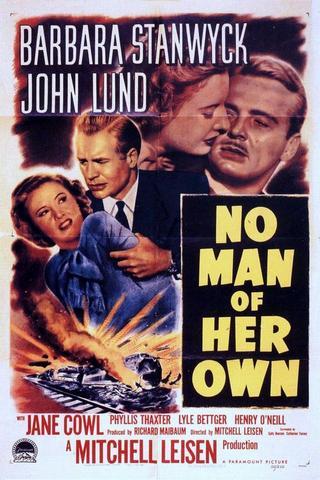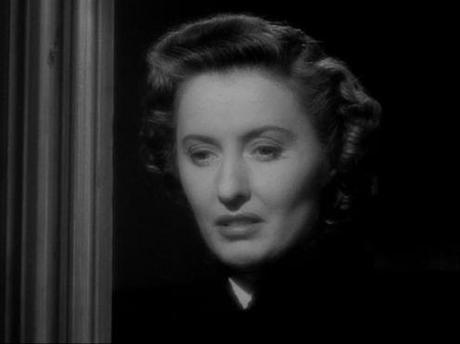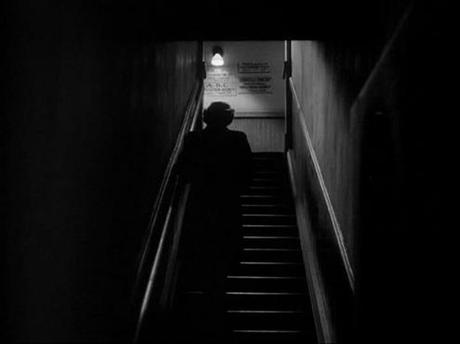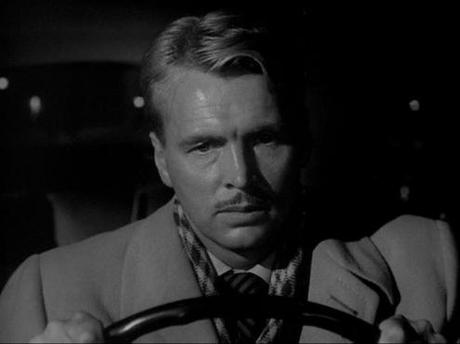
In the world of Cornell Woolrich every dream is in reality a nightmare concealed behind a mask, every instance of happiness is merely bait to lure the unsuspecting into the ultimate trap of despair. It should be no surprise therefore that his tales of dread with their outrageous turns of fate have formed the basis for a fair number of films noir. No Man of Her Own (1950) is a slick piece of dark cinema, opening with desperation, then tantalizingly suggesting that fortune may be more than just an illusion, before relentlessly gathering up those crumbs of comfort one by one.
Many a film noir has opened with a voiceover, frequently stentorian and strident, eulogizing the agencies of the law, or sometimes harsh, cynical and redolent of whisky, cigarettes and hard knocks. Here it's a different matter, dreamy and wistful with regret and resignation. As the camera pans across an idyll of suburban charm and respectability, and then on into a picture postcard house the weary tones draw the viewer's attention to the already obvious attractions, before trailing off to the merest whisper to acknowledge disconsolately: but not for us. On we travel, deeper into the home we now realize nurses something painful, perhaps even incurable. A man sits before his hearth, book in hand but tension writ large on his face, and across from him sits his wife, cradling an infant, rigid and apprehensive. Hers is the voice that has guided us inside, and the hers will be the memory that carries us back via flashback to the months before when a different brand of despair held her in its grip.

Helen Ferguson (Barbara Stanwyck) is in a bad way. She's pregnant and alone in a big city, with barely a dime to her name, nowhere to go and a former lover (Lyle Bettger) who wants nothing to do with her. In lieu of salvation she's presented with a door resolutely locked and an envelope shoved hastily across the threshold. This is the ultimate brush off, a cross country rail ticket, with a five dollar bill scornfully keeping it company. And thus she sets off, worn down by the life she's left behind and fearful for that within her and before her. The overcrowded train seems to foreshadow her future, perched precariously on the periphery, surrounded by apathy. Well, perhaps not quite. A sunny young couple (Phyllis Thaxter & Richard Denning), recently married and on their way back from Europe take her under their wing, the wife confiding how nervous she feels about meeting the in-laws who know nothing of her beyond her name. It's a bittersweet moment for Helen, a rare instance of compassion that both warms her for its simplicity and decency, and chills her too as it's a glimpse of the life she will never know. The latter is emphasized almost cruelly when her new acquaintance asks her to slip her ring onto her finger for safe keeping while she freshens up. It's here that fate, in the shape of a calamitous train crash, strides on the stage and alters the course of everybody's lives...
Mitchell Leisen is a director whose work I'm not overly familiar with, having seen only a handful of his movies and that being a long time ago. I recall reading somewhere that Billy Wilder was none too fond of Leisen, based I believe on his experience of scripting a number of films for him. What I do know for sure is that No Man of Her Own is a very stylish piece of work, fluid and smooth, seamlessly moving from that languorous opening narration - somewhat reminiscent of Rebecca in a way - into the long flashback that charts the peaks and troughs of horror and hope navigated by the heroine. Much of the action takes place in the family home, with occasional forays to a country club and also to the seedier part of town where blackmailers and chiselers can rent short term as they angle for the big score. Wherever the camera might roam, from secure domesticity to boozy squalor, Leisen frames his shots with great clarity and director of photography Daniel L Fapp lights and shoots it all in an atmospheric noir style. Dread and doom might be loitering with intent in the shadows, but they're awfully attractive shadows all the same.

Barbara Stanwyck was nothing if not versatile. There was always a toughness about her, but she could suppress that to some extent when a role required it. In No Man of Her Own she certainly displays grit, and there's more than enough adversity thrown her way to necessitate that, but she also manages to convey the essential vulnerability of her character, especially in the earlier scenes but later on too as the threats she faces see her options shrink. Throughout her long career she was able to slip from one character to another with ease, and this role offered her the opportunity to indulge in a wide and nuanced acting workout.
John Lund is impressive as the leading man. He starts out as an ebullient and carefree man of means, never any more serious than he needs to be. Then comes the suspicion, the persistent little niggles, the doubts which can never be entirely dispelled, finally seguing into the implacable fatalism of his love. The extent to which this love has consumed him becomes apparent in his dead-eyed determination to cover up a crime, and in his frank admission that whether or not it happened as he was told means nothing to him.

"That one may smile, and smile, and be a villain." Watching Lyle Bettger make his debut, it's hard not to have Shakespeare's lines from Hamlet spring to mind. Smug, impossibly self-satisfied and without the merest scrap of decency, Bettger was introduced to cinema audiences as a thoroughly bad lot. There's not one redeeming feature on show and he has the rottenness of the character down pat, not only the smirking and preening but also the steel edge beneath the surface which lends substance to his threats. Richard Denning and Phyllis Thaxter are not around long enough to make much of an impression in support. However, veteran stage actress Jane Cowl, in one of her rare and sadly one of her final screen roles too, is very good as the patrician matriarch. It's also worth mentioning that Dooley Wilson (the man every film fan will know as Sam from Casablanca) pops up in a virtual cameo early on. And of course Carole Mathews has a brief but decisive part to play.
No Man of Her Own was released on DVD by Olive Films some years ago, and I don't think it's ever been upgraded to Blu-ray - no doubt someone will put me right on that if I'm mistaken. It's a strong transfer, to my eyes anyway, and the quality of the image is pleasing throughout. This is a fine and hugely stylish film noir, highly polished in every department and just as highly recommended.
Other adaptations of Cornell Woolrich material which have been featured on this site:
